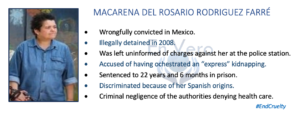Source: Journal Metro
Author: Joshua Goodman
February 24, 2017 (Original publication in French on March 30, 2016)
Translation: Jasmine Soso
A Colombian general who allegedly died along with the deaths of civilians but then was presented as a rebel was arrested Monday, immediately becoming the highest grade ever pinned for such a crime.
General Henry Torres, who has an administrative position within the army, surrendered to the justice when the arrest warrant for the murder that was launched against him became public.
The office of the Chief Prosecutor announced that he’d also demand the detention of the retired general Mario Montoya, who was close to president Alvaro Uribe who was leading the army when the scandal broke out in 2008.
The Colombian security forces reputation was put on the line when we learned about the thousands of civilians who were killed to inflate the balance sheets of their operations, which allowed them to earn bonuses or benefit from holidays. Only a handful of high ranking officers were however charged.
The arrest of M. Torres came at a time where the Human Right Watch were concerned that the agreement reached between the Colombian government and the rebels to put an end to the civil war that was tearing the country apart for many decades, could grant impunity to the military who claimed the civilians killed were in fact rebels.
The New York organization for the defense of human rights, in a report published Monday that the agreement reached between Bogota and the Revolutionary Armed Forces of Colombia (FARC) could permit the soldiers who are guilty of the systematic killings to get out of prison and/or justice altogether.
HRW recalls that those responsible or the perpetrators of the extermination policy will appear before special courts. Those who confess will avoid imprisonment and at the very most get 8 years of hard work to rebuild the communities that were destroyed by the conflict.
More than 800 soldiers were found guilty of having civilians killed during the fighting as insurgents. HRW believes that the ambiguity of the agreement could allow those responsible to not be prosecuted as perpetrators of these crimes. The recently sentenced militaries could even avoid prison and those already incarcerated could be set free.
“The agreement is a ‘checkmate’ of justice”, said director of HRW, by way of communication for the Americas, Jose Miguel Vivanco.
The military brigades have executed more than 4000 civilians across the country between 2002 and 2008, to make believe they exterminated more rebels in the confrontations.
General Torres, commanded in 2007, in the Eastern state of Casanare, a military unit that killed a father and his son to then claim that they were rebels.
The arrest of General Montoya, who has been ordered to appear before a judge on the 31st of May, would carry an even harder blow to the reputation of the army. The military, an ancient ambassador in Dominican Republic under president Uribe, has climbed the ranks of the army even if groups have long criticized him for having turned a blind eye on the abuse of a paramilitary group when the army took control of a slum in Medellin in 2002.




